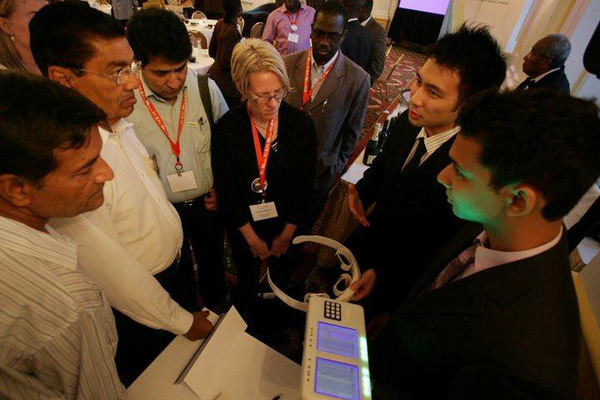October 24, 2011
Jhpiego receives $24.9 mill to innovate lifesaving tech

Whiting School graduate students Neil Shah, right, and Chris Chiang, second from right, both of the Center for Bioengineering, Innovation and Design, explain the ePartogram to participants in an innovations session at the Global Health Council 2011 conference, held in June. The ePartogram—an example of the innovative technology that will be championed by Accelovate—is designed to overcome the complexity and time-consuming nature of paper partograms so that midwives can increase both the volume and quality of care they provide. Photo: Pauline Lubens
Jhpiego, a global health nonprofit organization affiliated with The Johns Hopkins University, will lead a $24.9 million effort to expand its array of simple inexpensive lifesaving technologies to address today’s global health challenges. A cooperative venture with three additional partners, the initiative will leverage the engineering and medical expertise of the university.
The five-year project, called Accelovate, is funded by the U.S. Agency for International Development and capitalizes on Jhpiego’s 40 years of experience in the developing world, its deep understanding of global health challenges and its substantial record of achievement in developing innovative health care solutions. The project marshals the ingenuity of Jhpiego’s partners—the Johns Hopkins Whiting School of Engineering’s Center for Bioengineering Innovation and Design, Johns Hopkins’ Center for Global Health and Population Services International—to identify and develop health care technologies that create new markets, introduce them in the field and implement them nationally and globally.
“This is an exciting new venture that builds on the breadth of Jhpiego’s technical expertise and practical experience in bringing low-cost innovative health care solutions to countries to prevent the needless deaths of women and families,” said Leslie Mancuso, Jhpiego’s president and CEO.
As the project’s title conveys, Accelovate will identify and increase the movement of innovative but simple technologies from the lab to the village to help save the lives of the most-vulnerable people.
Examples of such lifesaving technologies include Jhpiego-CBID collaborations on a simple self-test for pre-eclampsia/eclampsia, the second-leading cause of maternal deaths worldwide; and a low-cost, easy-to-use blood pressure device appropriate for use by nonliterate community health workers.
Harshad Sanghvi, Jhpiego’s medical director and vice president for innovations, said, “We believe that bringing together the community of biomedical innovators to focus on global health needs and engaging with commercialization partners very early in the process has the best chance to fast-track urgently needed low-cost solutions to save more lives.”
Accelovate will be led by Hans Vemer, as director of Program and Research Utilization; Sam Dowding, as program administrator for Accelovate; Soumyadipta Acharya, graduate program director of CBID, as co–research technical director; and Youseph Yazdi, executive director of CBID, as co–research technical director.
“As engineers we are looking at these very large clinical and public health needs with a fresh perspective,” said Yazdi, of CBID. “We are developing technologies here at Hopkins to solve these problems in simple, elegant ways. The result will be transformational medical innovations that will solve some of the world’s biggest health care challenges.”
Added Thomas Quinn, director of Johns Hopkins’ Center for Global Health, “The diverse faculty of JHU affiliated with our center have a strong commitment and dedication to improving the health of all people worldwide. The multidisciplinary approach to this innovative project will enable us to utilize the expertise of all partners to help build in-country capacity and bridge new research findings into practice, particularly for those technologies proven to improve health in low-resource settings.”
Accelovate will work to overcome technical, supply and policy obstacles to introducing health technologies into the low-resource settings that can benefit from them the most. The objectives of the project are to:
• Identify and prioritize promising existing technologies and unmet needs for new technologies to address health development challenges;
• Advance the introduction of innovative health technologies in developing country settings, bridging the “research-to-use” gap in conjunction with capacity building;
• Lead efforts to scale up global access and utilization of transformational health technologies;
• Develop a significant subgrants program to support the achievement of the other objectives, including collaboration with other research and technology development partners worldwide; and
• Engage in selective development of promising health technologies that are appropriate, affordable and acceptable for distribution and use in low-resource settings.
“Several well-meaning health care technology innovations aimed at low-resource settings never see the light of the day outside the university laboratory,” said Acharya, of CBID. “This program will enable an integrated approach toward identification, development and deployment of transformative new technological innovations for some of the biggest health care challenges on our planet.”

